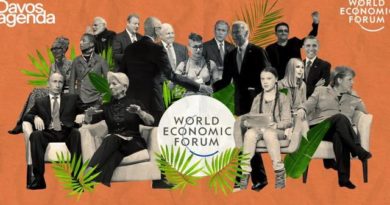Opinion: The problem with Davos: Klaus Schwab won’t leave the party

World Economic Forum founder Klaus Schwab delivers a speech during a session of the WEF annual meeting in Davos on Jan. 17.FABRICE COFFRINI/AFP/Getty Images
Last week’s World Economic Forum schmoozefest was a reminder that the organization’s 84-year-old founder and leader, Klaus Schwab, isn’t the Dr. Evil character that the global conspiracy theorists make him out to be. He’s Mr. Davos.
Which, for the organization he founded more than a half-century ago, is no great comfort. The executive chairman is steering the WEF not toward world domination, but irrelevance. If he has an evil plan, it might be to take his creation to the grave with him.
Oh, the group’s annual meeting in Davos, an exclusive ski resort in the Swiss Alps that has become synonymous with the WEF, still had its usual glitz and glamour this year. It still boasted a long list of global business and political A-listers. Davos was once again the place for the rich and powerful and well-connected to consume big thoughts by day and bountiful cocktails and canapé trays by night, after a three-year pause to in-person festivities courtesy of COVID-19.
And Mr. Schwab is still championing ambitious global ideas at the headline-grabbing event. His latest under the WEF banner is something called “the Global Collaboration Village” – a virtual-reality “metaverse” where thought leaders can meet and map out policy solutions.
But away from the bright lights, grand thoughts and invitation-only events, it’s hard to tell who outside of the Davos club cares any more. The WEF has become a victim of its own elitism.
Don Tapscott: What does the World Economic Forum at Davos really do?
At the extremes, this has manifested itself in wild conspiracy theories that Mr. Schwab is some sort of Bond-movie villain who seeks to manipulate world leaders, destroy capitalism and wipe out private property. (Elon Musk took to his Twitter platform last week to say that the WEF “is increasingly becoming an unelected world government.”)
This is, of course, ridiculous. But more reasonable thinkers dismiss the Davos proceedings as a self-indulgent gathering of the out-of-touch elites congratulating each other and bouncing big ideas off their own well-insulated walls. It’s all pretty harmless – and pointless.
In many ways, that’s even more damning. The exclusive nature of Davos and the WEF has left them talking to an ever-shrinking audience.
At the centre of the WEF’s image problem stands Mr. Schwab. And he won’t move.
Mr. Schwab’s own inflated ego is at the root of the WEF’s global conspiracies. A few years ago, he bragged that his organization has been able to “penetrate the cabinets” of numerous national governments around the world – including Canada’s – through former participants in the WEF’s Young Global Leaders program who have risen to political power. It was a gross exaggeration of the WEF’s influence, and a dreadfully ill-conceived boast.
The WEF has never been able to live it down – and it probably won’t, as long as Mr. Schwab remains at its helm. When Mr. Schwab wrote in 2020 about the potential for a “Great Reset” to emerge from the economic damage and policy innovations of the COVID-19 crisis, the conspiracists jumped on it as tied to his thirst to seize control of the world economy.
Yet the octogenarian insists on being deeply involved in all key facets of the WEF’s nearly $600-million-a-year operation, as well as being the very public face of the organization. He won’t discuss a timetable for stepping down.
It has become a major source of friction both within the WEF and among the organization’s global partners – and was, reportedly, a hot topic behind the scenes in Davos. People want to know how much longer Mr. Schwab will cling to power at the WEF – and how much damage the organization will suffer from his unwillingness to let go.
A report from online politics and policy news service Politico last week cited numerous members of the WEF community questioning Mr. Schwab’s unwillingness to plan for his successor, with some wondering aloud if he intends to die in the job. The report prompted an anonymous group of current and former WEF employees to contact British newspaper The Guardian with complaints about Mr. Schwab’s iron grip on the organization and his lack of accountability. They suggested that he has surrounded himself with yes-men and women in the WEF’s upper management, dooming the organization to a leadership void when Mr. Schwab is gone.
Over the years, there have been a few high-profile names that have surfaced as possible successors, including European Central Bank boss Christine Legarde and former British prime minister Tony Blair. But those musings – which Mr. Schwab himself has, to some degree, been willing to entertain – have never developed into anything more than amusing speculation. Mr. Schwab’s children, Nicole and Olivier, both of whom hold senior roles in the WEF, are also considered serious candidates.
Regardless, it has become clear that the WEF will have a serious and, perhaps, crippling image problem as long as Mr. Schwab insists on remaining its controversial public face and dominating force. If it is ever going to re-establish its credibility, it must break from the personality-driven vehicle piloted by the only leader it has ever known. It must establish credible new leadership that isn’t defined by a lavish annual party to which most of the world isn’t invited. Mr. Davos is an image that looks increasingly like an elitist, ego-tripping anachronism.
This article has been archived for your research. The original version from The Globe and Mail can be found here.


